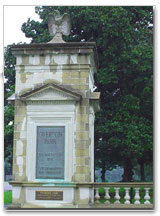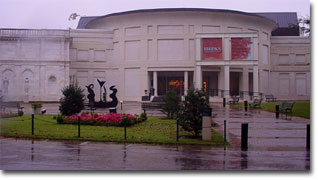Legal Overview
OVERTON PARK
Proposed Action

Overton Park is 342-acre city park located near the center of Memphis, Tennessee. The park contains the following features:
- a zoo
- a nine-hole municipal golf course
- an outdoor theater
- nature trails
- a bridle path
- an art academy
- picnic areas, and
- 170 acres of forest
In the 1950s, a six-lane, high-speed expressway was proposed which would sever the zoo from the rest of the park. Although the roadway would have been depressed below ground level except where it would have crossed a small creek, 26 acres of the park would have been destroyed. The highway was to be a segment of Interstate Highway I-40. I-40 would provide Memphis with a major east-west expressway, allowing for easier access to downtown Memphis from the residential areas on the eastern edge of the city. The route was approved by the Bureau of Public Roads in 1956 and by the Federal Highway Administrator in 1966.

The enactment of Section 4(f) prevented distribution of federal funds for the section of highway designated to go through Overton Park. The Secretary of Transportation had to first determine whether the requirements of Section 4(f) had been met. Federal funding for the rest of the project was, however, available and the state acquired right-of-way (ROW) on both sides of the park. In April 1968, the Secretary announced that he agreed with the judgment of local officials that I-40 should be built through the park. In September 1969, the State acquired the ROW inside Overton Park from the city.
Final approval for the project was not announced until November 1969. This was after Congress had reiterated that highway construction through public parks was to be restricted. Upon approval of the route and design, the Secretary did not indicate why he believed there were no feasible and prudent alternative routes. Nor did he indicate why design changes could not be made to reduce harm to the park.
Objection
Petitioners contended that the Secretary's action was invalid without such formal findings. They believed that the Secretary did not make an independent determination but merely relied on the judgment of the Memphis City Council. Respondents argued that it was unnecessary for the Secretary to make formal findings. They also argued that he did, in fact, exercise his own independent judgment, which was supported by the facts. Respondents introduced affidavits prepared for the litigation, which indicated that the Secretary had made the decision and that the decision was supportable. These affidavits were contradicted by affidavits introduced by petitioners. The petitioners also sought to take the deposition of a former FHWA Administrator who had participated in the decision to route I-40 through Overton Park.
Ruling
The District Court and the Court of Appeals found that formal findings by the Secretary were not necessary. They also refused to order the deposition of the former FHWA Administrator. In addition, the courts held that the affidavits contained no basis for a determination that the Secretary had exceeded his authority. The Supreme Court reversed the ruling of the District Court. The Court ruled that the use of Section 4(f) land requires a determination that there is no feasible and prudent alternative, meaning that there are unique problems or unusual factors involved in the use of alternatives or that the cost, environmental impacts, or community disruption resulting from such alternatives reach extraordinary magnitudes. A reference to exceedingly high costs or other objectionable factors associated with a project alternative, extraordinary magnitude characterizes the impacts to Section 4(f) or non-Section 4(f) properties as beyond the boundaries of feasible and prudent. This decision has defined Section 4(f) jurisprudence and practice for the last 30 years and led to FHWA documenting its decision-making process in a written Section 4(f) Evaluation. As a result of the Court ruling, Interstate 40 does not cross through Overton Park, and instead circumnavigates Memphis.
